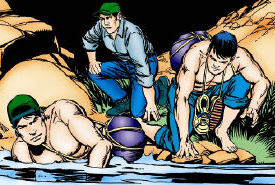 |
 |
 |
 News Around the Republic of Mexico | August 2006 News Around the Republic of Mexico | August 2006  
Mexican Park Turns Border Crossing into Sport
 Jeremy Schwartz - Cox News Jeremy Schwartz - Cox News


| | Advertising for the mock journey, which takes place at a nature park in the central state of Hidalgo, tells the pretend immigrants to "Make fun of the Border Patrol!" and to "Cross the Border as an Extreme Sport!"
|
Ixmiquilpan, Mexico - On a misty, moonless night, the group scurried down the canyon wall, their feet slipping in the ankle-high mud. The sirens grew louder as their guide, clad in a ski mask and known only as Poncho, urged them to run faster. "Hurry up! The Border Patrol is coming!"

A couple in matching designer tennis outfits loped awkwardly along, the boyfriend clutching a digital video camera and struggling to keep the pop-out screen steady.

The 20 or so people fleeing the Border Patrol aren't undocumented immigrants - they're tourists about 700 miles from the border. Most are well-heeled professionals more likely to travel to the United States in an airplane than on foot.

They've each paid 150 pesos - about $15 - for what is perhaps Mexico's strangest tourist attraction: A night as an illegal immigrant crossing the Rio Grande.

Advertising for the mock journey, which takes place at a nature park in the central state of Hidalgo, tells the pretend immigrants to "Make fun of the Border Patrol!" and to "Cross the Border as an Extreme Sport!"

As craven as the advertising sounds, the organizers say they are trying to build empathy for migrants by putting people in their shoes.

And the organizers, members of a Hnahnu (pronounced nyah-nyoo) indigenous community, speak from experience. Leaders estimate as many as 90 percent of the 2,500-person community have made the journey to the United States, most ending up in the boomtown of Las Vegas.

"We do this to show the people what it's like, to make them more conscious," said Hnahnu elder Luis Santiago Hernandez, who has crossed more than five times. Hernandez said that while they try to make the experience authentic, "It's not even 10 percent of the real thing."

The trip also seeks to educate participants on Hnahnu culture and represents a source of income for the community, leaders said. The Mexican government helped finance the creation of the Eco Alberto nature park, which is communally-owned.

Participants said they were lured by the realistic experience promised by the nearly six hour nocturnal walk. "It was like being in their flesh and bones," marveled Oswaldo Martinez, a 31-year-old computer security technician from Cuernavaca.

"It was cool - it was very fun," gushed his friend Mauricio Palacios, 30. "I never imagined it would be like that."

Until almost 2 a.m., the group scaled walls, hid in tunnels, jumped on the back of pickup trucks and followed a path through a cornfield. The trip ended with a blindfolded ride to a Hnahnu holy place where Poncho, whose real name is Alfonso Martinez Flores, asked the group to be more honest and sincere in their lives.

Word of the tourist attraction has provoked much head scratching among immigrant advocates in the United States and real life immigrants who have made the trek across the border.

Some called the risk-free adrenaline rush insulting. Others said it could improve the often-conflicted attitudes of Mexicans toward their compatriots who migrate.

"Anything that raises awareness in Mexico of the plight of undocumented immigrants is welcome," said Jorge Bustamante, special Mexican representative to the United Nations for human rights of migrants. "But the indifference is very strong, and it's greater as you ascend in social class."

Maria Garcia, a Mexican immigrant who founded the Hispanic Community Support Center in Duluth, Ga., said the mock crossing could be perceived as exploiting the suffering of migrants. "Someone crossing the border knows they could die," she said. "Someone going on this tour knows they will have fun."

Immigrant rights advocate Josefina Castillo, director of the Austin American Friends Service Committee office in Texas, said the adventure should include dialogue about the economic reasons immigrants leave home. "If it's just part of a show?then it would be (insulting)," she said. "It should lead to more education."

The trip starts with a rousing rendition of the Mexican national anthem and a meandering speech by Poncho, who bears an uncanny resemblance to Mexican Zapatisa rebel leader Subcomandante Marcos, in his black ski mask. Poncho tells his charges that they will not only be retracing the steps of migrants, but embarking on a personal spiritual journey. "Through this we are going to create the bonds of brotherhood that we've forgotten as a people," he says.

As the group sets off down the muddy road, high-pitched sirens pierce the night and the group begins the first of what will be many forced gallops through the woods. Coming into a clearing, the group crouches down as Hnahnu community members pretending to be U.S. Border Patrol agents shine a spotlight.

The mock agents try to lure the people out with food and water and warn them of the dangers of the desert. "We're here to help you," they call out in accented English.

Miriam Miguel Ramirez, 31, made the trip a family event with seven of her sisters and cousins from the state of Mexico. "It was heavy," she said. "It changes your image of the immigrants, of the courage they have. It made you think about a lot of things."

Nearly 70 members of the Hnahnu community take part in the experience, playing the various roles. "It's all the things we've been through," said 21-year-old Juventino Garcia, who made his first journey north at 15. "We're just trying to show the people what it's like." | 
 | |
 |



